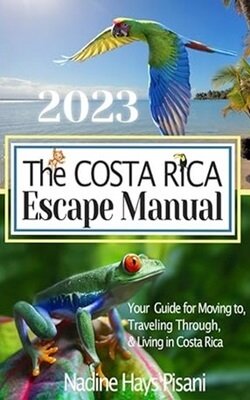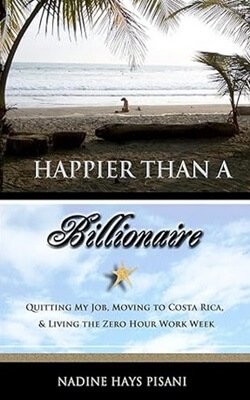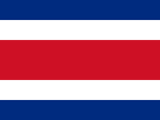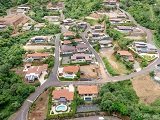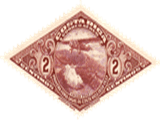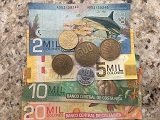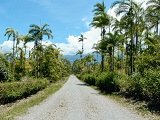- Home
- Moving Guide
- Real Estate
Search this site
Selling and Buying Property in Costa Rica
Residency Cost of Living Healthcare Real Estate Bringing Pets Shipping Mail Money Cars Drivers License Moving Resources
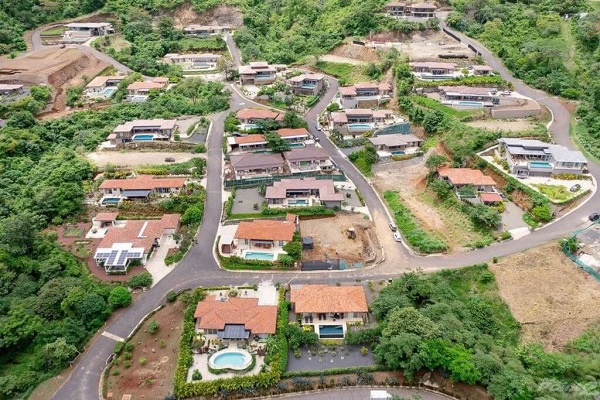
If you are considering selling or buying property in Costa Rica, the following article lays out the unbiased truth about real estate transactions in the land of Pura Vida that not everybody wants you to be aware of.
For those that are getting ready to make the big move or for those that just got here and are still in the Pura Vida vacation mode, please know that that over 50% of people that move to Costa Rica end up leaving after 2 to 3 years. The reasons can vary from health and family issues to boredom or not being able to adapt to a different culture, language and/or lifestyle. Before purchasing anything, spend lots of time here and make sure this country is a good fit before making the big financial investment.
Some will buy immediately, regret their decision and then spend years trying to sell, often times at a much discounted price. Others will rent and move around the country to find that perfect micro-climate before making the big financial investment. Some will invest, get lucky and see their investment soar in value.
If you decide to invest, I recommend that you obtain legal residency so that you are not a perpetual tourist requiring border runs every 90 days to keep your visa and drivers license valid. Perpetual tourist always run the risk of not being allowed back into the country if they go in and out too many times. There has been lots of discussion lately by the Costa Rica government about cracking down on this. You don't want to own property in Costa Rica and then not be allowed back in the country.
Whatever your plan is, buying and selling in Costa Rica is very different than the United States or Canada, surprisingly much more expensive and has many more things to watch out for as noted below:
- No Multiple Listing Service (MLS) - Therefore it is very difficult to tell what a property is worth, what similar properties sold for in the area, or how long a home has been on the market. Realtors will always show the list price but never post what it actually sold for.
- No disclosure requirement - The seller is not required to document existing problems. This could be related to the structural integrity of the house, susceptibility to flooding, electrical system issues, non payment of taxes, future plans of adjacent properties, property line errors or disputes, liens, lawsuits or water rights.
- Real estate agents are not licensed - Anybody can sell property in Costa Rica without any training and lots of people do. However, there are several outstanding and legitimate real estate agents and companies. Living here and networking with others in the community who had good experiences is the best way to find a reputable company and agent.
- Water rights - If you are buying land and you plan on building a house, you must have water rights to do so. If not, you will not be able to build on the land and you will be the proud owner of a large patch of dirt and perhaps a grazing field for cattle provided they get their water from somewhere else. Applying for new water rights is a lengthy process and could take 10 years or more, if it even happens at all. There are no guarantees.
- Escrow - Some will tell you that you don't need to use an escrow company. This is a big mistake. Plus you don't want to just pick any escrow company randomly as there are no regulations or guarantees that they won't take your money and run. Find a good real estate professional who works with a reputable company and network with others that have had good experiences. In doing so, you will see a pattern of the same recommendations popping up over and over.
- Attorney - Finding a good attorney can be just as much of a challenge, or more, as finding a good real estate agent. Important ! DO NOT EVER use the attorney that is recommended by the people selling to you. Most likely, they will not be looking after your best interest. Again, spend some time on the ground, network and get to know people.
- Contract - All final contract and escrow documentation must be in Spanish when filed with the Municipality of Costa Rica. While contracts and misc. documentation often start out in English for convenience, to be safe, always request the documents be in both Spanish and English. Why ? Because a contract solely in English has no teeth/value and is a useless piece of paper. So in summary, everything should be in English and Spanish with the English version being simply for convenience and the Spanish version the true legal document that is filed. This is why it is so important to have a good attorney that speaks both languages and can ensure that the documents are equal.
Buying Property in Costa Rica
Financing
One of the most common questions about buying a home in Costa Rica is whether financing is available. The majority of purchase transactions are cash. Some sellers will finance for 3-5 years with interest only payments every month and a balloon payment at the end. However, interest rates will be much higher than in the United States. For example when mortgage rates were 3 percent in the US, private financing was 7-8% in Costa Rica. An interest rate of 7-8% in the US will most likely cost 14-15% in Costa Rica.
Costs
This is where it starts to hurt. The cost to buy and sell property is much higher than the United States or Canada.
To buy property in Costa Rica, with or without a house on it, costs about 4.4% in closing costs. Closing costs consist of 1) property transfer taxes, attorney fees, value added tax of 13% on the attorney fees, and escrow company fees. Attorney fees are calculated via a Costa Rica standard sliding scale based on the contracted price of the home.
Closing costs are negotiated with the seller at the time of offer. It is common to split closing costs if it is a full price offer. For a less than full price offer, the buyer normally pays 100% of the closing costs, but this is all negotiable. The buyer will normally select the attorney, as the majority of the work during due diligence is the responsibility of the purchasing party to request information as needed. The seller should also retain an attorney to review the final documentation or to address any legal issues that arise during the process.
For a $500,000 USD property, closing costs will be approximately $22,000 . This does not include the buyer responsible fees for a property line survey (approx $400 USD) or a home inspection (approx $300-400 USD) that is not required but highly recommended to avoid problems down the road.
Typically the required earnest money payment is 10%.
Important! If for some reason you and your attorney find problems with the property and want to cancel the purchase contract, even for no reason other then you changed your mind, this can be done within the due diligence period and your earnest money will be returned. Once due diligence ends, the purchaser can forfeit their earnest money payment if they back out, even if only a day late.
Due Diligence
During the purchase phase there is a due diligence period, usually 21 days, where the buyer and attorney investigate and research the property. A good attorney will check for the following:
- Proof that property tax payments are up to date
- Proof that luxury tax payments are up to date, If the property does not qualify for the luxury tax, it is important to obtain supporting documentation from a professional justifying why.
- Property line survey.
- Home inspection.
- Water rights letter.
- Building plans accurately reflecting the home that are on file with the local Municipality. Do not accept plans given to you. Obtain the plans from the local Municipality.
- Building permit. Do not accept a building permit given to you. Obtain a copy from the Municipality. On the building permit there will be a maximum allowable build size in square meters. Ensure that the home, pool and decks do not exceed this number. However, there is a 10% overage allowance.
- Check for any property liens.
The three most common problems that need to be thoroughly vetted are 1) property line issues where structures or walls are not on the correct property, 2) plans and permits are incorrect, don't exist or were never filed with the local Municipality and 3) property does not have a valid water rights letter. I know at least a dozen people that experienced at one or more of the above issues while selling their home and the sale was lost. Once you buy it, it is yours, along with all of the problems that could make it impossible to sell in the future. Remember, the seller doesn't have to disclose anything and often times real estates agents may be aware of the issue but not say anything.
Important ! - The buyer should specify a hard date when the due diligence period ends. DO NOT
specify, for example, 21 business days as there will always be this
vague interpretation about Saturdays or one of the numerous Costa Rican
Holidays that falls on a Sunday but is observed on a Monday.
Selling Property in Costa Rica
Selling is expensive and a lot of people will be making money on your sale. With 50% of people leaving after 2-3 years, many of whom purchased a home, the real estate companies make a fortune on selling the same home over and over. I have personally watched one home that was sold three times in three years, each time bringing a 6% commission to the same company. This fact just reiterates, "make sure Costa Rica is for you before buying".
Commission
Real estate commission fees are 6%. Sometimes this can be negotiated down, but with a highly reputable agent, not likely. Then there is the Value Added Tax (VAT) of 13% on the 6% commission amount.
Capital Gains *
Costa Rica Capital gain taxes can fall into several categories as follows:
- If the home is your primary residence for at least 183 days per year, does not derive any rental income, then you do not have to pay capital gains taxes.
- If the home is your primary residence for less than 183 days per year, does not derive any rental income and it was purchased before July 1, 2019, you have two options - 1) a flat 2.25% of the selling price or 2) 15% of the selling price less the purchase price plus improvements.
- If the home is your primary residence for less than 183 days per year, does not derive any rental income and it was purchased after July 1, 2019, the capital gains will be 15% of the sales price less the purchase price plus improvements.
- If the home derives rental income, and thus considered an active corporation, the capital gain rules are similar with respect to before/after July 1, 2019 but the cost basis can get very complicated and you should contact an Attorney and Accountant.
Important! - Improvements can include furniture and appliances since most homes are sold turn key and ready for immediate occupancy. If you claim improvements, you must have receipts.
You may also be liable for Capital Gains tax from your home country. In the United States, where they tax worldwide income, the rules are the same as selling a home in the US. If the home is your primary place of residence for 2 years, and did not generate any rental income, any net profit up to $500,000 is not taxable, however you are still required to declare both the purchase and sale.
*Important! Capital gain tax liability for Costa Rica and your home country can change and you should consult a CPA and attorney before proceeding with any transaction.
Closing Costs
As mentioned above, closing costs consist of 1) property transfer taxes, attorney fees, value added tax of 13% on the attorney fees, and escrow company fees.
Depending on the buyer's offer, you may be on the hook for 50% of the 4.4% closing costs in order to sell the property. As aforementioned, this is usually split between the buyer and seller for a full price offer with the buyer paying 100% for less then a full price offer.
If your property was in a Corporation, and you are leaving the country, it will cost approximately $1000 to close the Corporation.
Example for a primary residence purchased before July, 1 2019 with a full selling price of $500,000 USD for someone who lived in Costa Rica for at least 183 days per year and the property did not receive any rental income:
- $30,000 Commission (6%)
- $3,900 VAT on Commission (13%)
- $11,000 Half of Closing Costs (2.2%)
- $1000 Close Corporation
Total Fees = $45,900, or 9.2 % of the selling price.
Net proceeds = $454,100
Now here is the really bad part. You hurried up and moved to Costa Rice without spending any time exploring first. You purchased quickly and now hate where you live. Maybe it is the weather, too hot or too rainy, or lack of proximity to a healthcare facility or you are not close to things that you enjoy. So you love Costa Rica and want to stay, but to do so, you will need to sell and then buy. As you can see from the examples above, assuming that you sold at $500K and bought at $500K, you will have tossed away nearly $70K USD which reiterates my point of "spend lots of time here in different areas" before investing in this country.
Costa Rica is a wonderful country with lots of offer. But it either it speaks to you or it doesn't. There isn't much of a middle ground. Do your homework and don't rush into buying property in Costa Rica. When you do, make sure that you are well educated in the process and have successfully networked and found reliable and ethical professionals.
